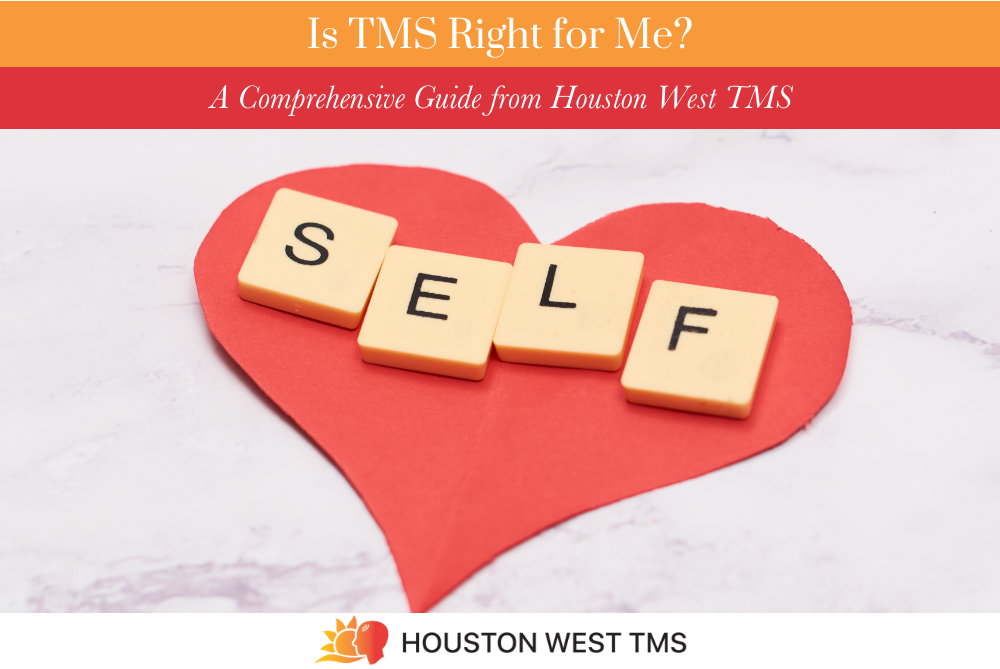 When living with depression or other mental health conditions, it’s natural to seek relief that feels effective, safe, and sustainable. For those who haven’t found success with traditional treatments like medication or therapy, Transcranial Magnetic Stimulation (TMS) could be the solution you’ve been looking for.
When living with depression or other mental health conditions, it’s natural to seek relief that feels effective, safe, and sustainable. For those who haven’t found success with traditional treatments like medication or therapy, Transcranial Magnetic Stimulation (TMS) could be the solution you’ve been looking for.
At Houston West TMS, we specialize in personalized, cutting-edge mental health care. One of the most common questions we hear from new patients is: “Is TMS right for me?” Let’s dive into what TMS is, who it can help, and how to determine if it’s the right path for your journey to healing.
What Is TMS?
Transcranial Magnetic Stimulation (TMS) is an FDA-cleared, non-invasive treatment that uses magnetic fields to stimulate nerve cells in the brain—particularly those involved in mood regulation. TMS targets areas of the brain that are underactive in people with depression and other conditions, encouraging improved neural activity and communication.
Unlike medications, TMS does not require systemic absorption, meaning it avoids many of the common side effects associated with antidepressants, such as weight gain, fatigue, or sexual dysfunction.
Who Can Benefit from TMS?
TMS is most commonly used to treat Major Depressive Disorder (MDD), especially in individuals who have not responded to at least one antidepressant medication. However, it’s also showing promise for:
- Anxiety disorders
- Obsessive-Compulsive Disorder (OCD)
- Post-Traumatic Stress Disorder (PTSD)
- Bipolar depression (with caution and monitoring)
- Chronic pain syndromes
Is TMS Right for Me?
If you’re wondering whether TMS is a fit for your needs, consider the following:
✅ Have you tried at least one or more antidepressant medications without relief or with intolerable side effects?
✅ Are you looking for a non-drug treatment option with minimal side effects?
✅ Do you experience treatment-resistant depression or anxiety?
✅ Are you not pregnant, free of metal implants in or near the head, and not diagnosed with a seizure disorder?
If you answered yes to most of these, TMS could be a suitable treatment for you. Of course, a proper evaluation by a specialist is the best way to know for sure.
What to Expect at Houston West TMS
At Houston West TMS, we tailor each treatment plan to your unique needs and health history. Here’s what the process looks like:
- Initial Consultation – We begin with a thorough assessment, including medical history, symptom review, and a discussion of your treatment goals.
- Treatment Planning – If you’re a good candidate, we map the treatment area of your brain and establish a schedule. TMS is typically administered five days a week for 4 to 6 weeks.
- In-Office Sessions – Each session lasts about 20 to 40 minutes. You remain awake, seated comfortably, and can return to normal activities right after.
- Progress Monitoring – We monitor your response closely and adjust your treatment as needed. Many patients start to see improvements within a few weeks.
Advantages of TMS
- Non-invasive and medication-free
- Minimal side effects (most commonly scalp discomfort or mild headaches)
- No downtime—you can drive yourself home
- Long-lasting relief for many patients
- Covered by most insurance plans
Frequently Asked Questions (FAQ)
Q: How long does it take for TMS to work?
A: Many patients start noticing improvements in mood and energy within 2 to 4 weeks, though full benefits may be seen after the complete course of treatment.
Q: Is TMS covered by insurance?
A: Yes! Most major insurance providers cover TMS for treatment-resistant depression. Our team at Houston West TMS can help you verify coverage and manage the approval process.
Q: Can TMS replace my medications?
A: In some cases, yes. Some patients are able to reduce or eliminate the need for antidepressants after successful TMS treatment. However, this should always be discussed with your provider.
Q: What does TMS feel like?
A: During treatment, you’ll feel a tapping sensation on your scalp. It’s not painful, but it may be unusual at first. Most patients get used to it quickly.
Q: Are there any risks?
A: TMS is considered very safe. The most common side effects are temporary and mild. Serious risks, such as seizures, are extremely rare and occur in less than 0.1% of patients.
Contact Houston West TMS Today
If you’re tired of struggling with depression and ready to explore a new path to wellness, we’re here to help you find the right treatment.
📍 Houston West TMS
902 Frostwood Dr. Suite 283
Houston, TX 77024
📞 Phone: (713) 464-4455
Let’s work together to bring light back into your life.
Final Thoughts
You don’t have to accept living with depression as your new normal. TMS offers real hope for people who have tried everything else. If you’re still wondering, “Is TMS right for me?” — schedule a consultation with Houston West TMS today. A better tomorrow could be just a few sessions away.
